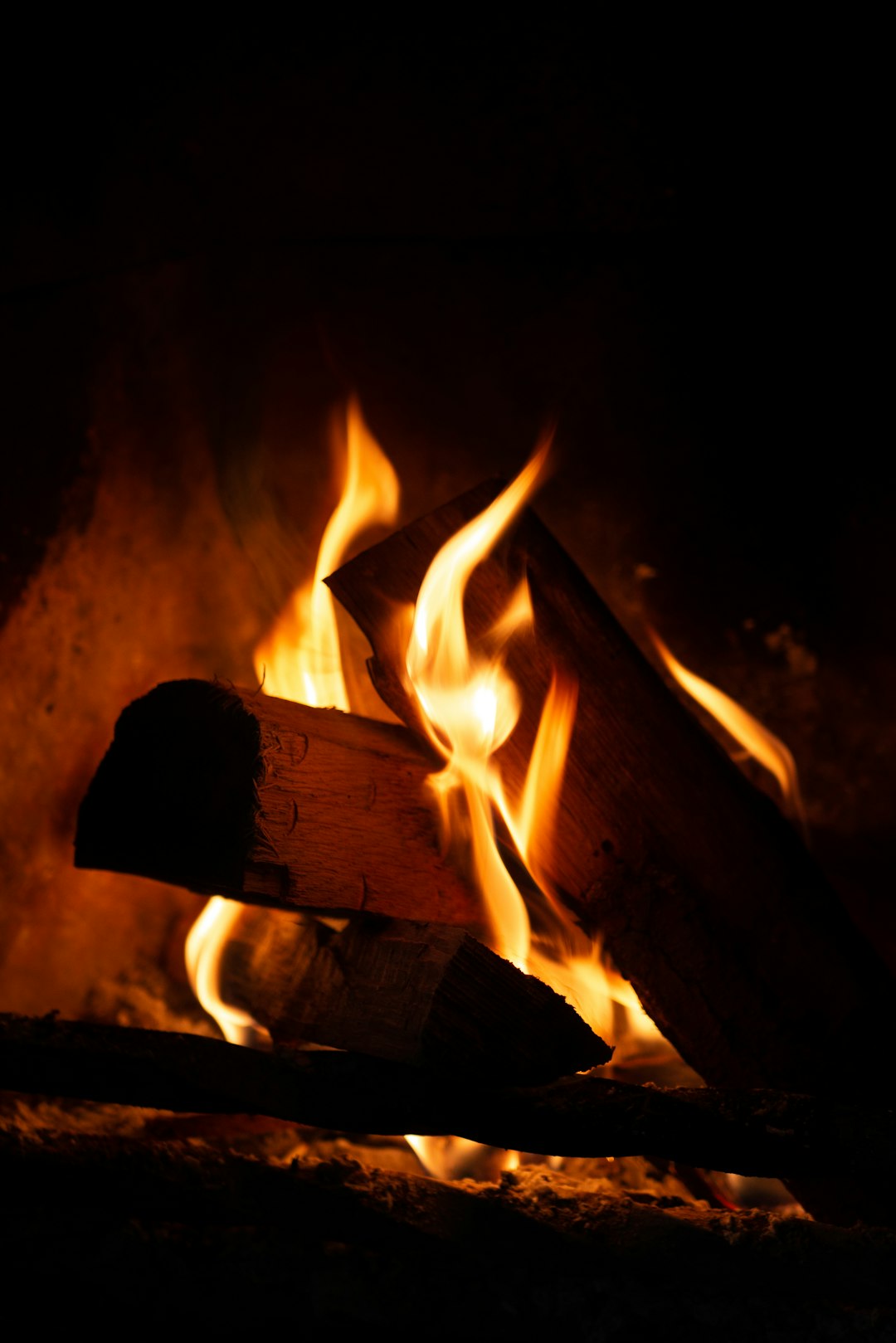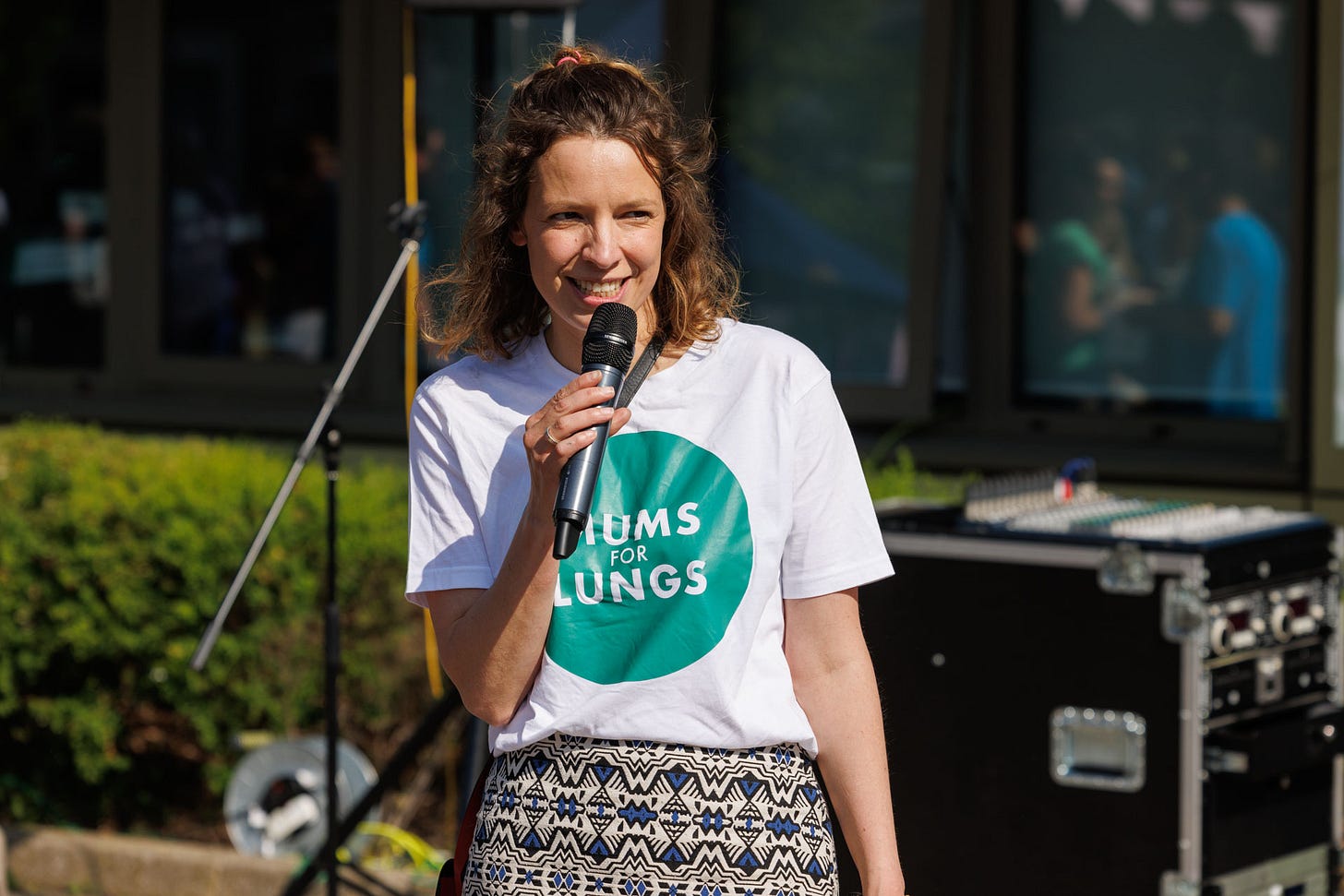“Everything around wood burning is the height of green washing.”
An interview with Jemima Hartshorn, founder of the grassroots network Mums for Lungs, who lives in London
“Everything around wood burning is the height of green washing. And it does affect your neighbours, especially if you live in a town. No one wants to speak out about it as it’s incredibly divisive but just 8% of UK homes have wood burners or open fires but it’s one of the top two sources of particle pollution in the UK, and that exposure has serious impacts on health.”
I used to love log fires as much as the next outdoors-loving person. Then, about a decade ago, we moved into a new house with an open fire and whenever we used it my son and I would get this weird viral wheeze. He even ended up in hospital at one point. The next winter, we didn’t use the fire and were both fine.
I appreciate such anecdotes don’t prove anything, but it did get me reading more about the effects of wood burning on public health, especially in built-up towns such as Brighton & Hove, where I live, or mountain valley towns, such as Chamonix. In 2015 I wrote a piece about the health problems that air pollution was causing in Chamonix and the restrictions they’ve since placed on open fires and wood burners.
A report by DEFRA shows that even an Ecodesign stove emits six times as much PM2.5 as a Euro 6 HGV lorry per hour (PM2.5 is the fine particulate matter that is associated with decreased lung development and function, increased risk of lung cancer, allergies, COPD, and making asthma worse), but it’s interesting how the negative effects of wood burning are never really mentioned in the outdoors community or the media at large, with some notable exceptions, so, I thought it would be good to speak to Jemima from the grassroots organisation Mums for Lungs about it all.
Hey Jemima, I’ve been thinking about how central log fires are to the culture of the outdoors, even for those of us who live in cities, and how that contrasts with what scientists are saying about how harmful wood burning is to health, especially in urban environments…
Yes, I used to ski when I was younger and also spend a lot of time hiking and staying in mountain huts and the campfire was the essential bit at the end of the day.
But it’s a real irony that there is this sector of people, who love the outdoors, and are usually really quite environmentally aware – they would never leave plastic or litter anywhere, they championed reusable bottles before everyone else – but when it comes to fire, it’s this massive blind spot. It’s a real problem.

Why do you think that is?
Wood burning is seen as such an environmentally and climate-friendly thing to do, something natural and healthy. It doesn’t make sense from a carbon point of view, it’s not remotely renewable, and then there is the health aspect…
The problem with wood burning is that it’s seen as this thing that has always been done – man has always sat by a fire – but you can look at that type of narrative and say well, man never used to use antibiotics and people used to die at 40.
People are more aware of the dangers of car pollution in cities today, and of leaving your engine running, but for some reason it does seem to be a really slow process [when it comes to wood burning], but I am quite hopeful of changing the mindset.
When did you start Mums for Lungs?
I set up Mums for Lungs and started campaigning when I was on maternity leave, almost seven years ago. At that time, even Guardian reader types were sceptical when we talked about how polluting cars were. But now there has been a massive shift in people’s understanding of that, the behaviour hasn’t changed as much as we need, and SUVs are 51% of all the cars sold in the UK, but there is a real increased understanding that car pollution is bad.
Local authorities understand this, even Tory government ministers have said things, but I would hope we can also do something around wood, as awareness around wood burning is very low. Chris Whitty [the Chief Medical Officer] published a report on air pollution about a year ago and it had a key section on wood burning but we don’t have enough people speaking out.
Parts of the country, for example in London and Brighton, are smoke control zones, but the situation is so complicated. You can have an open fire as long as you only burn what’s called ‘smokeless fuel’, but obviously there is no such thing as a smokeless fuel. Or wood will have a sign on it saying that it’s ready to burn, which means it’s less than 20% moisture.
But also, when you have a fire no one is going to be able to stop you from putting anything else in it. If your neighbour offers you half of his tree, are you really going to wait for that to dry for two years if you’re living in London or are you going to actually just chuck it on your fire? Your kids’ toy kitchen is wooden and painted? Again, are you going to wait to dispose of it properly or just chuck it on the fire?
The regulations are different depending on where you live and they’re impossible to enforce because who is going to come inside your living room and check what you’re doing? Even if your neighbours report you and the council comes over and stands there, you don’t have to let them in, and they can’t get on the roof to check. And they’re not going to come out on a Saturday night when you’re most likely to be burning wood anyway.
Do you feel like regulation is not actually going to drive change and that raising awareness would be more helpful?
I think we need both. In the UK, there are a few councils that stand out on wood burning every so often, especially in London.
But it’s an unpopular message and it ties into the idea that we don’t need experts or to be told what to do. A lot of government policy has been around not being the nanny state. But I think you can say to people: “I’m not stopping you from burning right now but your burning might cause asthma in your neighbour’s kids or harm your elderly relatives who are spending Christmas with you.”
An increasing number of people in the UK are diagnosed with lung cancer having never smoked in their life from air pollution and someone needs to say it and they need to say it loud.
You often see ads for ‘eco wood burners’, are they any better?
There was an EU regulation, which included the UK, that all wood burners produced after January 2022 had to be ‘extra clean’, but extra clean still means they can emit something like 400 times as much pollution than gas heating, just not 1000 times more.
Everything around wood burning is the height of green washing. And it does affect your neighbours, especially if you live in a town. No one wants to speak out about it as it’s incredibly divisive but just 8% of UK homes have wood burners or open fires but it’s one of the top two sources of particle pollution in the UK [along with biomass burning by industry], and that exposure has serious impacts on health.
What would you say to people that have wood burners already?
Just use it on special occasions [as they do in Paris] and not very cold days, as air pollution is usually worse on very cold or very hot days when the air is still.
All our campaigning is about when people don’t have alternative sources of heating, we’re not talking about remote mountain huts here, but I think as soon as you have neighbours you do have a responsibility to them. You wouldn’t do other stuff like pollute their water access, no one would accept that, so why is it ok to pollute their air quality?
For more on Mums for Lungs and the health effects of wood burning head here.
And here’s a piece I wrote about air pollution and wood burning in Chamonix a few years ago.
Other news:
I’m still on my biannual news break so haven’t got loads to share but I do highly recommend you watch Thrawn: a Stubbornly Scottish Snow Film, starring one of my all-time favourite people (and future newsletter interviewee) Lesley McKenna and made by another all-time favourite pal Hannah Bailey.
It profiles the Cairngorms snowsports community through Lesley’s eyes including archive footage shot by her grandfather Chic Baxter, who I was once lucky enough to meet and still remains one of my elder icons for the fact that he was still cycling around the hills on an ebike in his early 90s.
The latest issue of Huck is out now, including an interview that I did with Sea Sisters, an awesome social enterprise in Sri Lanka that seeks to get girls and women surfing, while also raising awareness of plastic pollution.
As ever, please fwd this newsletter to anyone who you think might be interested & if you have any story tips on any of these themes pls get in touch.




Good awareness raiser!
I think a good illustration for outdoors people of how much smoke does is that it clogs up waterproof jackets dwr enough to stop it working pretty fast - see e.g. https://eu.patagonia.com/gb/en/stories/the-care-feedin/story-20267.html
Also little to no discussion ever of indoor air pollution from gas hobs...!